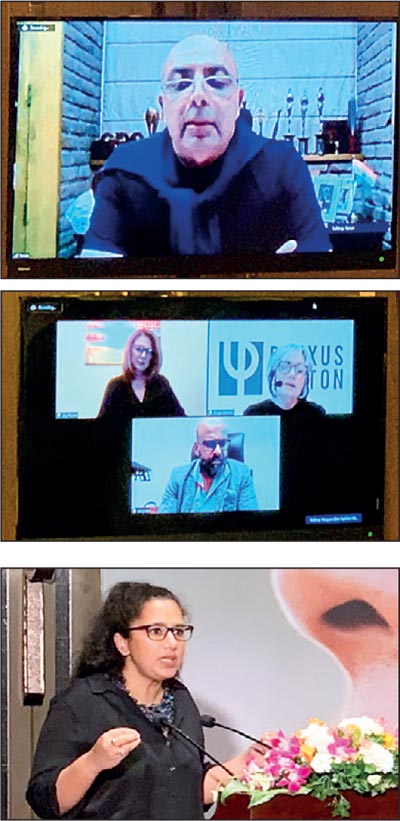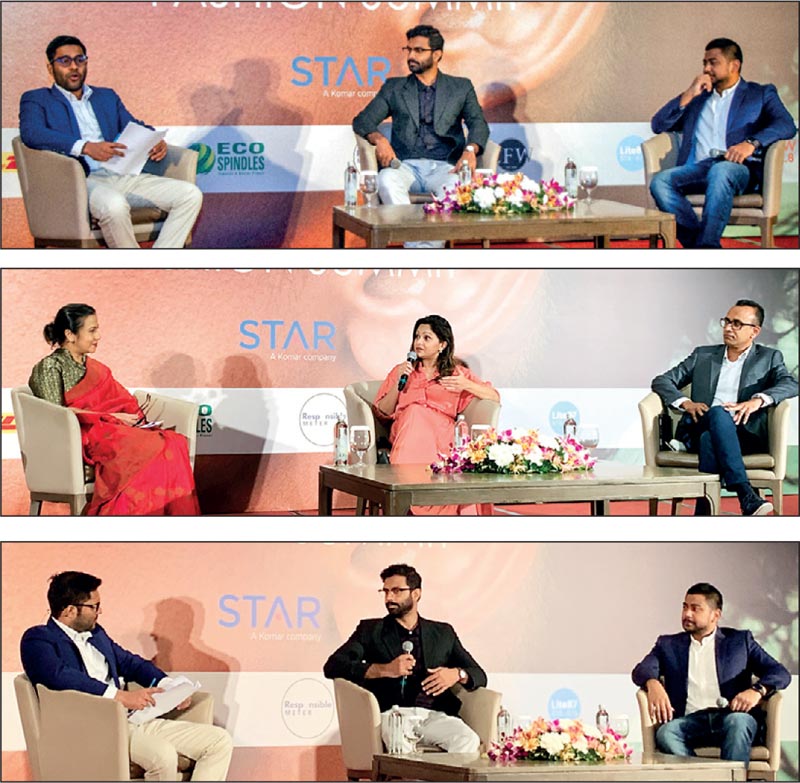Monday Feb 23, 2026
Monday Feb 23, 2026
Friday, 26 November 2021 02:56 - - {{hitsCtrl.values.hits}}

By Safna Malik
 The 6th edition of Responsible Fashion Summit (RFS) 2021 concluded with a call to action to lessen global fashion industries› negative impact on the environment. The Star Garments Group along with JAAF/Sri Lanka Apparel organised this insightful conference last week at the Shangri-La Hotel in Colombo.
The 6th edition of Responsible Fashion Summit (RFS) 2021 concluded with a call to action to lessen global fashion industries› negative impact on the environment. The Star Garments Group along with JAAF/Sri Lanka Apparel organised this insightful conference last week at the Shangri-La Hotel in Colombo.
This year›s summit gathered an interesting panel of local and international key personalities in the fashion industry to share their views on sustainability, and how they incorporate responsible fashion practices into their creative process.
The RFS 2021 was hosted as a hybrid conference to adhere to the Covid-19 protocols. The panels had an enriching discussion for four hours under the theme ‘Circularity in Action,’ featuring different segments addressing the trending topic of circularity that can evolve to minimise fashion industries negative impact on the environment and another important agenda point they spoke about is the introduction of the Responsible Meter, which is a garment evaluation tool.
Delivering the opening remarks Responsible Fashion Summit Founder Ajai Vir Singh said he was pleased that the Star Garments Group, JAFF Sri Lanka Apparel, Eco-Spindles and DHL came on board to support their initiative that strives and aims to bring focus on current needs and relevant solutions. “We need more important industry players to push this initiative on the global stage. I feel we are on our way,” Vir Singh added.
The first panel discussed the impact of circularity in the discipline of designs. A renowned Developing Consultant and Leadership Coach Dr. Mihirini De Zoysa moderated this session along with three panellists Abraham & Thakore Director David Abraham, Hirdaramani Group Head of Designing Piumi Perera and Inqube Solutions Ltd. VP of Design Arjuna Hettikankanam.
Hirdaramani Group Head of Designing Piumi Perera explained where jeans stand in terms of circularity and the opportunities and challenges in the fashion industry.
She said their designers look for the durability of the product, whether it could be easily disassembled and recycled when re-emerging jeans. The jeans are manufactured in different ways and styles such as acid washing, and stone washing gives an iconic look to a pair of jeans. However, the process of making jeans misses important principles of circularity and sustainable fashion, which is design without pollution and waste.
“To keep clothing products useful for longer, designers should regenerate natural ways and embrace new methodologies. The future of jeans for a manufacturer as we get comfortable with cleaner technology, cleaner processing and better material imports we are getting ready for a new generation of consumers and this is our market in the next 10 years,” she added.
Abraham & Thakore Director David Abraham joined via Zoom to speak about opportunities and challenges when working with small-scale industries following circularity and sustainable practices.
He said India is known for its diversity and culture. They still practice and follow their traditional craft and handloom methods that add more value to high-end fashion in India. The traditional craft and handloom is a large-scale industry in India that needs a labour force rather than machines.
Connecting both circularity and the sustainability of livelihoods Abraham said: “The labour force is a very important source of livelihoods. We have a great history and access to ancient skills that will be useful in the present and future to incorporate with modern fashion conversation. When we talk about circularity, we must talk about the sustainability of livelihoods as well.”
Inqube Solutions VP of Design Arjuna Hettikankanam spoke about the challenges and opportunities that any larger apparel organization would face to bring circularity into their business module from a design perspective.
He highlighted the most common challenge as designing towards sustainability and circularity limits creativity. Since consumer demand for more sustainable and circular products are growing, manufacturers strive to deliver more sustainable and circular products on a large scale, at the right price. However, these targets won›t be met if the manufacturers follow the same design practices and methodologies they used for other products before.
Hettikankanam said some of the problems as an industry they face are limitations and difficulties they encounter are predominantly around materials and processes. In terms of materials, it’s difficult to create more ecological products without sustainable materials. Even though there is more development and innovation for alternative or conventional materials the options are quite limited.
He said finding the best materials is a difficult task even though as manufacturers we manage to find the perfect materials that don’t come on refinement as we expected or that level of materials is so expensive that it doesn›t make a commercial scale. Creating that material into a piece of shirt or a dress would need more improvements to make it more ecologically friendly and to support a more circular process.
“It’s a limiting factor for creativity, I think it’s all about the mindset. When we need a change we choose to focus on the limitation, embrace new opportunities, start to be creative at a higher level or start looking beyond product thinking. The whole process of putting that into context starts thinking positively and beyond the product creativity is limitless,” he added.
One of the best young entrepreneurs in Asia Mi Terro Co-Founder and CEO Robert Luo via Zoom spoke about how he turned spoiled milk into fibre and how he made revenue out of it.
He said according to statistics 1.3 tons of food which is estimated 125 to 160 billion pounds of food goes to waste every year out of that 16% of dairy products 160 million tons are discarded. Luo considers costs and material performance as the two key challenges faced by sustainable clothing brands. The company is currently developing the second version of its milk waste fibre, which they claim requires 60% less water than organic cotton, and is 100% biodegradable.
Mi Terro Company saves excess milk from its dairy farm partners and skims it to remove fats before dewatering it to turn the liquid into powdered milk. It’s then dissolved again and purified by removing the bacteria out of it or the bad casein, from the expired milk. Casein makes up 80% of milk protein.
Once the bad casein is removed, the remaining protein will be turned through a spinneret to solidify it into a fibre. The fibres are then stretched and spun into yarn for clothes manufacturing. Luo mentioned these materials can be also used in bed linen, food packaging, face masks, or to create toilet papers.
The second panel discussed the readiness, challenges and opportunities regarding circularity in fashion supply chains. MAS Holdings Senior Analyst Chathushka De Alwis moderated this session along with two panellists Hela Clothing Ltd. Director – Strategic Brands Nissanga Wanapura and MAS Holdings Sustainable Product Lead Pasindu Samarakkody.
Samarakkody spoke on the readiness of the fashion industry related to pursuing opportunities in circularity and points out where we stand as an industry and what needs to be done.
In terms of readiness, there are two sides to the whole circularity coin. Clarifying it in detail he said, Iif we take re-commerce and repair as an example it has happened for the past 18 to 24 months we spotted many re-commerce sites that are coming up, different platforms, new concepts and a lot of consolidation happening in this space. Many units of clothing have been resold and repaired. However, the recycling or the other side of the coin is still about 24 months away from seeing that happening on a mass scale. There are few technological unlocks that are required and the economy is a bit tough right now to take a step. Though I believe if the entire industry starts to work together we can overcome these challenges easily.”
Wanapura shared his perspective on some of the company wide initiatives that have been taken to drive the circularity concept. He said in terms of company-wide strategies understanding how brands have evolved is one of the first things that has been driving them.
“A few years back this concept was rather self-driven by the vendors in Sri Lanka, wanting to be sustainable and to be circular. The vendors have to provide this to the brands, have to go and convince them wanting to start with recycled products, pre-consumer or post-consumer products. Now I see a big change in the brands wanting this more than the vendors do,” he added.
Wanapura also highlighted the fact that circular products have a bigger saving than what we produce which adds a value point to the supply chain in the fashion industry.
The third panel was hosted by Eco Spindles Yarn CEO Nalaka Seneviratne along with three panellists, Purify Global CEO Joy Nun, Plexus Cotton Head of Marketing Paige Earlam and Stretchline Holdings Chief Operations Officer Moyne Perera who joined virtually to discuss the influence of circularity in textile innovation.
The fourth-panel consisted of HSBC Head of Marketing Tharanga Gunasekara, CHARINI Founder Charini Suriyage, Sri Lanka Accreditation Board former Chairman Didul Kotagoda and CFW RFS Founder Ajai Vir Singh joined to discuss the readiness climate of standardising sustainable design that bested SMEs and the responsible meter.
Responsible Fashion Summit 2021 concluded with a presentation on detoxing fashion by MAS Environmental Sustainability Director Sharika Senanayake. The founding member of the official fashion week governing body, the Fashion Design Council of India Tarun Tahiliani also joined via Zoom to discuss the ‹Perspective of Luxury in the Pandemic›.
